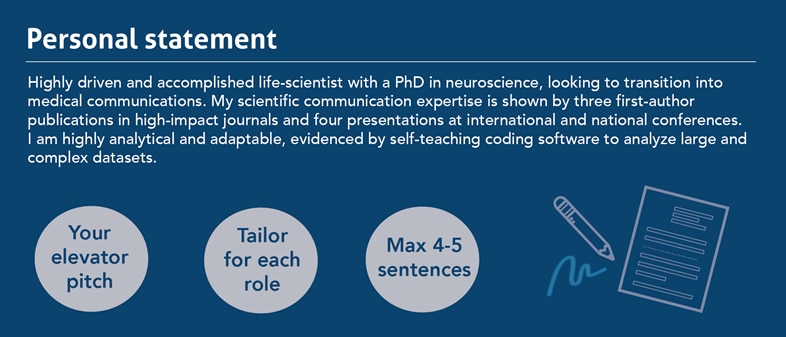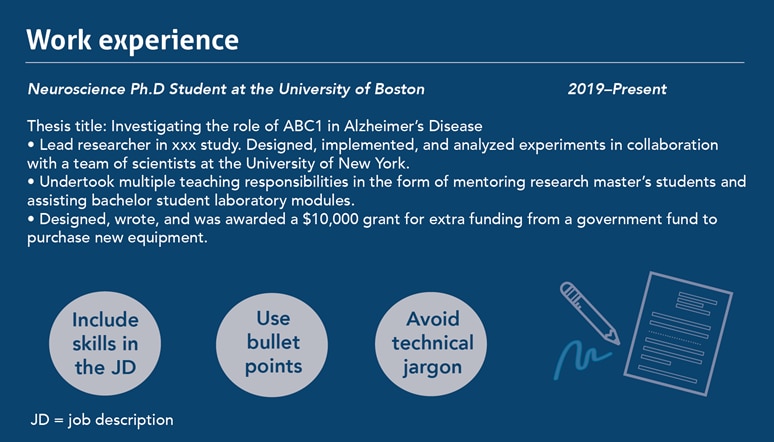How to write an industry resume/CV
Are you a life-scientist looking to change your career path? Learn how to write an industry resume/CV
Applying for jobs outside of academia can seem daunting and often in the academic echo chamber it can be hard to find relatable advice. The first step when applying for any job is to write or update your resume (North America) or CV (short for curriculum vitae; UK and Europe). These are essentially the same documents, just named differently depending on which side of the Atlantic Ocean you live.
Your resume/CV should contain an overview of your work experience, skills, education, and achievements. In this blog, we will focus on what it should contain when transitioning from academia to industry for lab and non-lab scientific roles. The information should be taken as a rough guide—different countries, industries, and companies will have different guidelines as to what an industry resume/CV should contain. Make sure you read the job description and application notes!
Key points:
-
Your resume/CV should be no longer than two pages.
-
Do not write in long paragraphs. Short concise sentences are best. Bullet points are your friend.
-
Use technical language and details sparingly, and only if directly relevant to the role.
-
Proofread, proofread, proofread. Make sure there are no spelling or grammatical errors.
-
Tailor each resume/CV to every job you apply for.
Thought experiment: Imagine that you are the hiring manager and need to read 50 CVs in 1 hour. A 4-page document with wordy paragraphs will be moved into the “no” pile. It has been shown that recruiters spend only 75 seconds per CV (1).
Layout
Personal and contact details
Your name at the top, centralized, large, and in bold (color option here). Beneath this put your contact details: email, phone number, and address (city is fine if you do not want to include your full address).
Personal statement
This should go directly under your contact details. The personal statement is a brief summary of your achievements and should highlight what you can bring to the table for this particular role. It should be no longer than 4–5 sentences.

Work experience
Start with your most recent employment. Put the job title in bold next to the institution, with a clear timeline of start/end dates (month and year). And yes, your PhD does count as work experience!
For research work experience, what you write here is dependent on the type of industrial job you are applying for. For a non-lab-based role, you can briefly describe the research area you were in and the responsibilities you had. Make sure to include aspects of your role such as student mentoring, outreach events, paper writing, peer-reviewing, grant writing, presenting at lab meetings, managing grant budgets, consumables ordering, etc. These all demonstrate a wide skill set that is not just limited to science techniques and are therefore important to include.
If the job is lab-based, then a short list of the relevant techniques is required (for example, don’t explain in depth your proficiency at electrophysiology if you are applying for a job in assay development). For a non-lab-based role, a summary of the types of techniques, e.g., immunoassays, proteomic studies, electrophysiology, analysis of large and complex data sets, should be sufficient to demonstrate your scientific prowess.

Awards and Achievements
In this section, you can mention publications, prizes, grants, and conference attendances. If you have more than one publication or many publications, DO NOT LIST THEM. Just mention the number and name-drop some publications, e.g., 5 first-author publications from 2019 to 2022 in high-ranking journals including Nature Communications. If you want or need to include the full list of publications, consider adding an addendum on a separate page after your main CV/resume.
Education
Start with your most recent degree and work backwards. If you have not yet finished your PhD, then put the starting month and year to present, e.g., September 2018–Present. Most likely you will have covered your PhD projects and responsibilities in the work experience section. Here you can list any extra courses you took, e.g., attending an R workshop from Proteintech.
For your BSc and Master’s degrees, state the degree name, years attended, and the grade you achieved. DO NOT list all the modules taken and their individual marks; this is unnecessary and will waste space. Only list modules if they are directly relevant to the job; for example, a Python/coding course if applying for a data scientist position.
You can include your high school details and grades but keep them brief and to one line.
Skills
Here you can list relevant skills to the job role. Keep this section short. Software proficiency, languages, and driving license should be listed here if asked for.

Hobbies and interests
This section is optional, be it should be kept short and aim to get your personality across. Make sure your interests are unique and demonstrate your non-lab/fun side. Often these might be used as an ice-breaker at certain points of the interview, for example, “You ran the London Marathon, impressive! Would you do it again?”
References
It is not necessary to include named references here. You can simply state “References available upon request.”
Final thoughts
The above information should be taken as a guide only. The contents of a CV/resume will differ depending on the job role and country. Some jobs at big corporations will have online forms to fill in for each section rather than the option to upload a single document. Take your time to write this and make sure you get many different eyes on it before sending it to a hiring manager. Good luck!
For other tips on careers and life as an early-career researcher visit our ECR hub.
Related Content
Interview with an Early Career Researcher: Odetta Antico
Navigating a PhD in a pandemic
How to prepare for a PhD viva - ten tips for success
How to write a good scientific abstract
Support
Newsletter Signup
Stay up-to-date with our latest news and events. New to Proteintech? Get 10% off your first order when you sign up.
